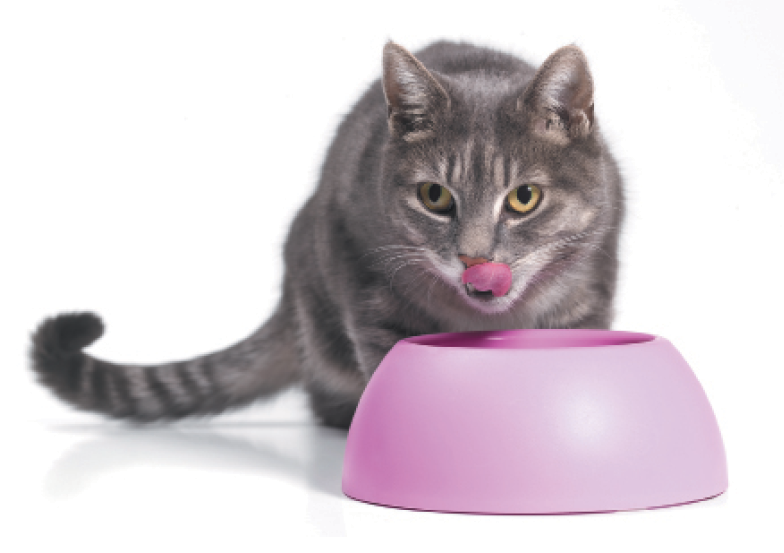Cat foods and treats are continually evolving, with trends seen in ingredients, formulations, functionality and more. New innovations are exciting, but sadly, not all new products or ingredients are in cats’ best interest. Read on to hear from pet nutrition experts about the latest developments in cat food and treats, including which trends are good news for cats and which ones to watch out for.
New ingredients
Anna Kate Shoveller, PhD, a professor in the University of Guelph’s Department of Animal Biosciences, Ontario Agricultural College, is seeing many new ingredient evaluations in the scientific literature, including pulses (beans, chickpeas, lentils and peas), co-products, upcycled ingredients and even insects.
“More ingredients mean more diversity in the food space and increased supply-chain sustainability for the pet food industry,” she says.
Dr. Shoveller also says there is research on ingredients that support the gut, skin, coat, immunity, plus provide satiety control (helping pets feel full) and more.
Some of these trending food ingredients are marketed as more sustainable than meat. But this claim falls in a gray area, particularly when comparing them to products containing co-products (ingredients produced during human food processing that are used for pet food) or animal feed-grade ingredients.
“Plant-based may be less environmentally sustainable in contrast to these ingredients that humans do not consume,” Dr. Shoveller says.
Plant-based foods
Plant-based vegetarian and vegan cat foods are more common now then even before. Some pet owners might want to feed their cats plant-based foods due to their own dietary habits or feelings about the environment, but nutrition experts urge caution due to the fact that cats are obligate carnivores who are designed to eat meat.
“Plant-based foods have been a great alternative for humans who have either allergies, diet restrictions based on religion or philosophy, or just because they prefer them to animal-based foods,” says pet food researcher Mohamed Obanni, based in Davis, California . “However, cats have been carnivores since creation. Plant-based foods may be a solution to some cats’ diet problems and may be tried as a variety, but not to sustain their healthy living.”
Dr. Shoveller points out that vital compounds cats require in their diet are not found in plants, so these types of diets need to be supplemented. “So now you need to account for the offset of those supplements,” she says. “This is a wildly complicated area to put together accurate prediction models for.”
Another problem with plant-based diets is making them palatable to cats, as they much prefer the taste of meat to other vegetarian ingredients.
Treats that do more
Dr. Shoveller is seeing more functional treats—those with physiological benefits, such as calming, joint health, skin and coat health, gut health and more.
“People want more than just something that tastes good to their cats,” Mohamed says. “Nutritional benefits are a must. Cat owners also seem to like interactive treats, such as ones that break apart like a chocolate bar.”
Limited-ingredient treats
Johnna Devereaux, clinical pet nutritionist and chief nutrition officer at Bow Wow Labs, says the new normal is single-ingredient, freeze-dried treats using just one meat source, such as chicken, turkey, salmon or tuna. Such treats are a healthy way to reward your cat without unnecessary ingredients.
Food toppers
Food toppers are designed to be mixed into your cat’s regular diet to improve taste or nutrition.
According to Johnna, some food toppers are intended to increase palatability while others deliver supplements, such as therapeutic mushrooms, antioxidants, functional herbs and more.
Food toppers are generally high in calories and fat, so they should not replace your cat’s regular food but simply be included in small amounts.
Supply-chain issues and price increases

It’s not a welcome trend, but supply chain issues continue to plague not only the human food market, but pet foods and treats, too.
Dr. Shoveller thinks that with climate change, social unrest, a recession, swinging pandemics and a general shortage of work force across agricultural sectors, supply-chain issues might actually get worse before they get better.
Mohamed points out that prices might continue to climb due to the increasing costs of transportation, which affect raw materials used to make cat food.
To avoid finding yourself without your cat’s only food, Johnna suggests rotating between proteins and brands, something that can not only balance out any nutritional deficiencies but also helps cats be more robust, less finicky eaters.
Dr. Shoveller also recommends using multiple foods that fit your budget and your cat’s nutritional needs, and rotating among those diets. She says that this diversifies nutrient delivery, flavors, shapes and hardness.
5 Tips for Choosing a Cat Food
In a vast sea of cat foods, it can be hard to know which food is best for your cat. Dr. Shoveller points out that there is no “best food.” The choice depends on your budget and your cat’s nutritional needs. “There are good choices for your pets at every purchase point, and the pet food industry does a good job at providing those options,” she says.
Check out these tips from pet nutrition experts about choosing a healthy cat food:
- Ask your veterinarian for advice on a diet that is adequate for your cat
- Determine your budget
- Select the right life stage (kitten, adult or senior)
- Look for benefits specific to your cat’s needs; for example, “hairball” or “urinary support”
- Don’t be afraid to try something new. Many high-quality food brands allow you to return the food if your cat won’t eat it.
